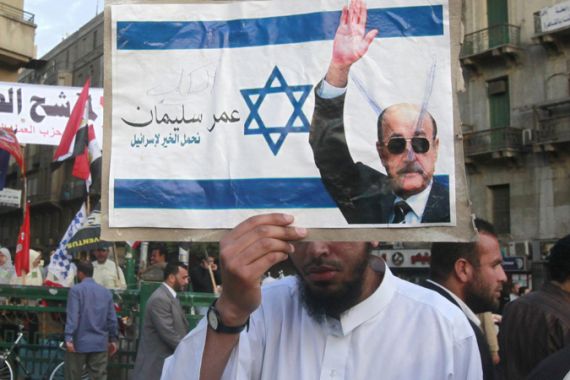Egypt parties meet military over constitution
Head of military council meets with 17 political parties and groups as 10 candidates are barred from presidential poll.

Egypt’s military leader has held talks with political leaders as next month’s presidential election was thrown into further turmoil with the disqualification of ten candidates.
Field Marshal Hussein Tantawi met with the heads of 17 political parties and groups on Sunday to discuss the dilemma surrounding the Constituent Assembly and the writing of the new constitution ahead of the first presidential poll since a popular uprising ousted long-time leader Hosni Mubarak last year.
Tantawi stressed that the new constitution had to be written by June 30, in time for the new presidency.
According to the MENA state news agency, the Muslim Brotherhood, whose candidate Khairat al-Shater was barred from running for office, attended the meeting, as well as the Al-Nur party, which represents the more conservative brand of Salafi Islam.
On Saturday, Egypt’s election commission said that 10 of the 23 registered presidential candidates had been barred from the race, including Omar Suleiman, the former intelligence chief, Shater and the Salafist politician Hazem Abu Ismail.
Suleiman, Mubarak’s head of intelligence for two decades, was briefly appointed vice president, but quit the post in February 2011 when the president resigned following weeks of mass protests against his 30-year rule.
His registration had infuriated the political forces who were at the forefront of last year’s revolt, with many regarding his candidacy as proof that promises of a transition to democracy were merely cosmetic.
‘Monopolising politics’
Secular groups were furious over Shater’s candidacy, accusing the Muslim Brotherhood of monopolising politics after dominating parliament, and a panel tasked with drafting the constitution, after their success in this year’s elections.
| REASONS FOR DISQUALIFICATIONS | ||||||||
|
The Muslim Brotherhood had repeatedly vowed not to present a member for the top job, but in a dramatic reversal it put forward Shater, as well as party chairman Mohammed Mursi as a back-up candidate.
Al Jazeera’s correspondent Sherine Tadros in Cairo said that the High Elections Commission has issued a statement where it has explained in detail why it has disqualified each of the ten candidates.
“Abu Ismail for example, the Salafi candidate, there was a big question mark over whether he could run or not because this issue of whether his mother was a dual national.
“The commission said they sought advice of the US officials, who provided them with ample evidence to show that she (Abu Ismail’s mother) has had an American passport since 2008,” our correspondent said.
Abu Ismail is therefore out of the race because his mother holds another nationality, violating election rules which state that all candidates, their parents and their wives must have only Egyptian citizenship
Shater, who was released from prison in March last year, was barred because of a law stating that candidates can only run in elections six years after being released or pardoned, Abul Atta said.
Shater, who was deputy chairman of the Muslim Brotherhood – banned under Mubarak – had been in jail on charges of terrorism and money laundering.
His disqualification came a week after an Egyptian court cleared the way for Abu Ismail to join the race after ruling that his mother was not a US citizen.
Commission official Tarek Abul Atta told the AFP news agency on Saturday that Suleiman had been disqualified because he failed to garner enough endorsements from 15 provinces as required under the law.
Opportunity to appeal
The candidates have two days to appeal against the commission’s decision. The body will announce its final candidate list on 26 April.
“All these reasons seem to be a done deal although you have to bear in the mind that there is about 24 hours left for each of the candidates to appeal these decisions,” our correspondent Sherine Tadros said.
In a statement on Facebook, Shater said: “We will continue working through all legal channels.”
His campaign argued he could not be disqualified because of an “unjust” conviction under Mubarak, criticising the move as “political, not legal.”
The Supreme Council of the Armed Forces (SCAF), which is headed by Tantawi and took power when Mubarak was ousted, will also examine a law passed by parliament that would ban members of the former regime from standing for office.
If approved, the law could also see Ahmed Shafiq – Mubarak’s last prime minister – excluded from the May 23 to May 24 election.
The military council will also discuss a court ruling suspending the Brotherhood-dominated panel that was tasked with drafting the country’s new constitution.
The SCAF has promised to hand power to civilian rule in June after a president has been elected.